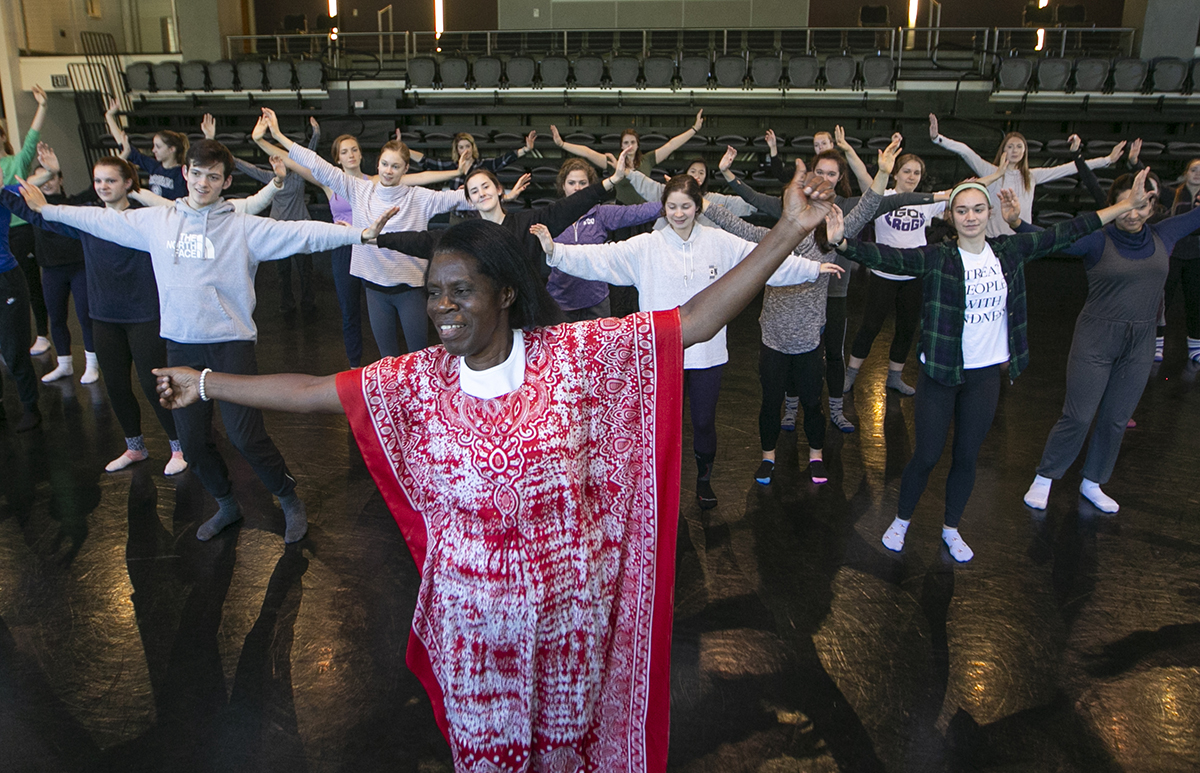
Finding Peace Through Dance
Godelieve Mukasarasi, Rwanda native and TCU’s 10th Global Innovator, uses dance and shared experience to help women recover from trauma.
As Christmas approached in 1994, Rwanda was reeling. The frenetic violence that erupted on April 6 had ended in July, but the East African nation had barely begun to recover.
Militias of Hutus, the country’s largest ethnic group, killed nearly 1 million minority Tutsis and moderate Hutus. Their bodies filled mass graves near stadiums, churches, schools. Rwanda’s infrastructure was in shambles, and thousands of people fled the country.
Because so many men died in the genocide, Rwanda’s population became 70 percent female. But many of those women were recovering from unspeakable brutality. The Interahamwe — paramilitary Hutu killing squads — used rape to humiliate and torture up to 500,000 Tutsi women, including grandmothers and girls as young as 10.
Some of the crimes were committed by neighbors. Many attacks were carried out in public. The sexual violence was meant to break the human spirit. When the women begged to be killed, militia men refused. “We’re going to leave you alive so you will die of sadness,” the men often told the women they attacked.
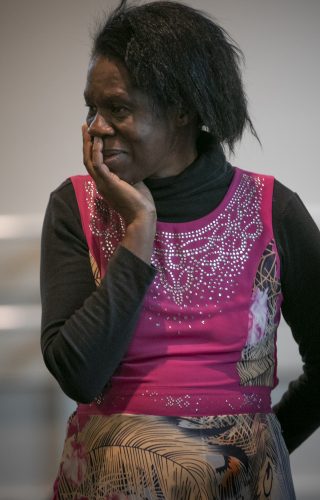
Godelieve Mukasarasi of Rwanda received the 2018 TCU Global Innovator Award. Photo by Rodger Mallison
Godelieve Mukasarasi, a social worker in the Rwandan village of Taba, watched women go about their work with empty eyes and expressionless faces. After the genocide, many learned they had contracted HIV. Some were pregnant as a result of rape. All the women seemed shut down emotionally, becoming numb as a coping strategy.
Mukasarasi is Hutu, but she married a Tutsi man. A devout Catholic, she said she made a deal with God when the genocide began: If my children survive, I will focus on a charitable work. As she surveyed the listless women walking down the same streets where they were violated, she wondered what to do for them.
Mukasarasi said that as she prayed one day she had a vision of women crying, then laughing. She decided to invite women to her home. First in pairs, then pairs of pairs: Widows would talk with widows; rape survivors would talk with other survivors.
On Dec. 28, 1994, Mukasarasi focused on the small circle of women in her living room. That day, the group chose a name: Solidarity for the Blooming of the Widows and the Orphans, Aiming at Work and Self-Promotion — or SEVOTA.
Women who had been raped were often shunned by their families — discussing sexual violence was taboo in Rwandan culture. Many of the traumatized women were unable to put their experiences into words. But the women understood one another. They reminded one another they were beautiful and still good, despite the shame the community directed toward them.
Years later, similar groups would meet in 11 communities across Rwanda, serving thousands of women and their children. Some of them, especially the ones in Taba, would play a pivotal role in the world’s first prosecution of rape as a war crime.
For her role in the Rwandan recovery, Mukasarasi has received international recognition, including awards from the U.S. and Canadian governments. Even TCU sent a delegation to Taba, a small town in Central Rwanda. In March 2018, Mukasarasi became the university’s 10th Global Innovator, an award that will help expand her charitable programs.
Safe Space to Heal
Mukasarasi remembered her vision of women turning tears into laughter. She invited those gathered at her home to move their bodies in the traditional dances of Rwanda — movements everyone knew from community and family celebrations.
“Dancing relieves your mind, takes away what you think and makes you laugh,” Mukasarasi said through an interpreter during a TCU campus visit in November 2018. “When we are singing or dancing, everyone has a part.”
Mukasarasi combined the dances with stretches and breathing exercises to counteract the women’s trauma-induced head and body aches. She led them in lighthearted movements — like pretending to swim while standing on dry land — that dissolved into laughter as the women watched one another move.
The physical movements helped the women begin to process trauma, even if they couldn’t describe it in words. Suzanne Garrison ’05, a movement therapist who visited a SEVOTA gathering in 2018, said she uses the same approach in her practice in New York City. “Trauma is primarily a neurological, not psychological, disorder. Often, repressed trauma shows up in body-felt sensations.
“It becomes the crushing sensation in your chest that’s anxiety or depression, or nightmares or flashbacks, or brain fog where you can’t focus or engage in what you’re doing,” Garrison said. “You can’t recover until you become really familiar with those sensations and understand they’re not something to be afraid of.
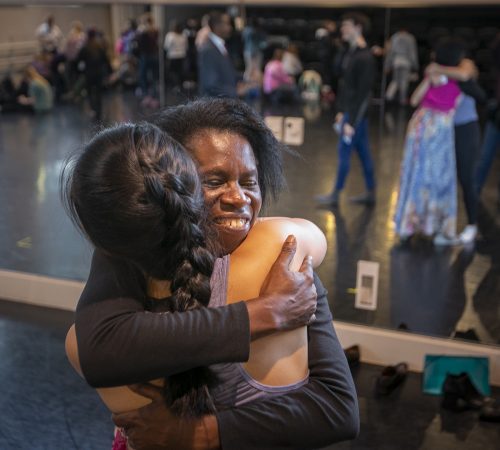
Godelieve Mukasarasi hugs a student after a November 2018 healing dance class. Photo by Rodger Mallison
“That’s something that SEVOTA and Godelieve do really well: By moving and dancing together and experiencing those potentially harmful body-felt sensations, they create a safe space where healing can begin.”
As SEVOTA groups formed in other Rwandan villages, the organization’s reputation spread. International experts in trauma-healing techniques came to visit and to train Mukasarasi and other counselors.
In the mid-2000s, Mukasarasi turned her attention to the thousands of children born of rape after the genocide. She said many were starved for emotional connection with their mothers, who often abused the children because they considered them a constant reminder of their rapists. Neighbors reinforced the stigma by shunning the fatherless children.
The kids had reached their preteen years and were asking about their fathers: Who were they? Where were they? But the children’s mothers didn’t know how to respond. In some cases, women were raped by so many men that they had no idea who fathered their child. Some rapists lived next door; others fled the country to escape prosecution.
Mukasarasi developed retreats for the mothers and children where they could have frank discussions about the children’s parentage. To reduce the stigma and isolation, she started programs that brought the children of rape and other village children together.
“Godelieve chose to bridge the gap between those kids and their mothers and their families,” said Irene Kwihangana ’19, an engineering major from Rwanda who visited SEVOTA in January 2018 with a small group from TCU. “Those kids are also part of Rwanda’s future, so they need to be trained and get an education. It’s important that we take care of that generation.”
Prosecuting Genocide
As the Rwandan women helped one another heal from grief and trauma, their national government established gacaca courts, a judicial system to handle the enormous number of cases related to the genocide.
The judicial system classified crimes according to their level of severity. When some of the women of SEVOTA learned that rape was classified as a Category 4 offense, on par with stealing a basket or a goat, they approached Mukasarasi. They were indignant: We can’t tolerate that, the women told her. It’s demeaning. You’ve got to do something. They marched in protest from Kigali, the nation’s capital, to Taba, about 24 miles away.
Meanwhile, Mukasarasi visited Kigali and met with the dozen female members of Parliament. She invited the politicians to come to Taba and listen to the women’s stories of sexual violence. After visiting, the female parliamentarians urged their male colleagues to reclassify rape as a more serious crime. As a result, rape became a Category 1 offense, making it as serious as murder.
While the gacaca courts proceeded in Rwanda, the United Nations organized an International Criminal Tribunal in Arusha, Tanzania, to prosecute the genocide. Taba’s mayor, Jean-Paul Akayesu, stood trial. At the time, no one had ever been convicted of genocide. Neither had rape been prosecuted as a crime of genocide, despite being listed as a war crime in international law since 1919.
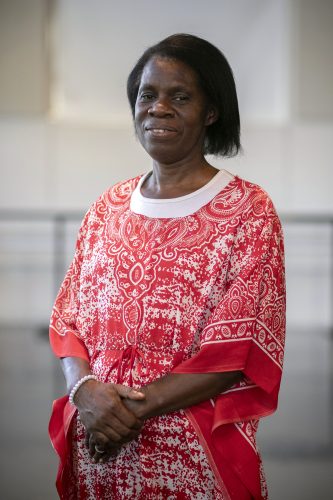
Godelieve Mukasarasi uses dance and laughter to help Rwandan women recover from violence. Photo by Rodger Mallison
At the start of the trial in January 1997, Akayesu’s criminal charges did not include sexual violence. But then a woman testified that she had seen him coordinating the rapes of women who had sought safety in his office.
The tribunal added rape charges against Akayesu, and U.N. investigators went to Rwanda searching for survivors and witnesses who were willing to testify. It was a difficult proposition: Witnesses were under tremendous pressure — and threats — not to testify against the militia members who remained in their community.
But the women of SEVOTA — the same women who could barely speak about their traumatic experiences three years earlier — had become emboldened by their successful effort to reclassify rape in the gacaca courts.
Mukasarasi, who was approached by U.N. investigators, asked SEVOTA members if they would testify. “Many women refused to go speak out,” she said. “In our culture, it’s hard for women to talk about rape. I had to go talk to them one by one and say, ‘This is our chance to help other women.’ ”
Three women agreed. At the court in Tanzania, they were given pseudonyms and seated behind a curtain to protect their identities. But secrets are hard to keep in small towns, and people in Taba knew who they were. The women described their attacks for the court, mustering composure as Akayesu’s attorneys asked insensitive questions.
“Can you imagine that you’ve never been on an airplane before, you’ve never been in a courtroom before, and here you are sitting in front of this international tribunal being asked to talk about the most horrific things that have ever happened to you?” said Erica Barks-Ruggles, who served as U.S. ambassador to Rwanda from January 2015 to March 2018. “That’s got to be scary.”
Akayesu denied responsibility for the crimes against him. But on Sept. 2, 1998, the tribunal found him guilty. He became the first person convicted of genocide and the first person convicted of rape as a war crime. He was sentenced to life in prison.
The four women of Taba — the witnesses and Mukasarasi — were unlikely heroes, said John Singleton, director of international services at TCU, who has traveled to Rwanda several times and has met the witnesses.
Singleton said the four women were just everyday people who changed the face of an atrocity, impacting humanity.
But the witnesses went to court in Tanzania without their main supporter. In December 1996, Mukasarasi’s husband and 11-year-old daughter were killed. Her husband, who was poised to give testimony before the international tribunal, and her daughter were gunned down by suspected militia members.
But “those witnesses would not have been able to testify if [Mukasarasi] hadn’t organized SEVOTA and they weren’t in the process of healing and taking action to stand up for themselves,” said Michele Mitchell, an American journalist whose 2016 documentary The Uncondemned features Mukasarasi in its chronicle of the Akayesu trial.
“You have to have the person who’s the catalyst, bringing people together to talk and to heal, and that was what she did,” Mitchell said. Mukasarasi also “encouraged those women to step forward. It’s a scary thing to testify, so to have somebody you respect and who is helping you heal and recover from something terrible is crucial in making sure that you go through with it.”
Healing Dance
In January 2018, a van rolled to a stop outside the cinder-block community center in Taba. Visitors from TCU stepped onto the red dirt one by one. Singleton and Garrison were the first to emerge. Then came two dance professors. Finally, six students.
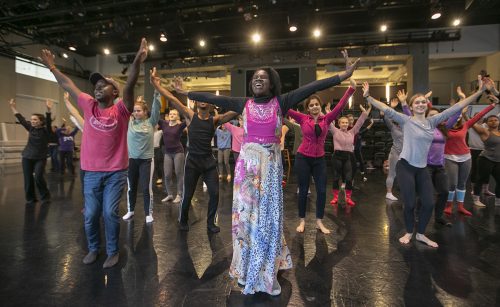
Godelieve Mukasarasi dances with TCU students at a class on the healing power of dance. Photo by Rodger Mallison
The women of SEVOTA lined the walkway, singing and dancing as the visitors walked into the building. Inside the center, the women raised their arms to represent the horns of a cow, the most important animal in the Rwandan economy. Later, their husbands entered the room, wearing traditional attire as they performed a warriors’ dance.
At the event, Mukasarasi encouraged her SEVOTA sisters to dance again. Only this time, the women showed their guests a dance they created to express their journey from trauma to healing.
That winter visit was the result of a relationship that started in 2013, when Mitchell visited the TCU campus for a screening of her first documentary, Haiti: Where Did the Money Go? The filmmaker was embarking on her next project about rape in conflict zones.
During her visit, Mitchell learned about TCU’s Rwandan students. The filmmaker invited TCU students, both U.S.- and Rwandan-born, to work on The Uncondemned and credited the university as an associate producer.
After a premiere in Kigali, Mitchell’s documentary was screened in October 2016 at the U.N. headquarters in New York City, with Mukasarasi and the women who testified against Akayesu in the audience. Afterward, the women attended a similar screening at TCU.
In March 2018, the U.S. State Department named Mukasarasi one of nine International Women of Courage. Former ambassador Barks-Ruggles nominated her for the honor. “Godelieve, through her work with this group of women, and with the formation by all of them of SEVOTA, they didn’t just leave it at the prosecution of Akayesu,” she said. “They said: ‘How can we help ourselves and our communities recover?’ So it’s a story of hope as well.
“It’s not just about getting the bad guys,” Barks-Ruggles said. “It’s about creating hope and helping renew communities after the most horrific experiences that humans can have.”
When another TCU group visited Taba in fall 2018, Mukasarasi presented the women in SEVOTA with the hand-blown glass globe given to the TCU Global Innovator Award recipient.
“She held it up and said, ‘These people gave me this award, and now I’m giving it to you because you’re the ones who’ve done the work,’ ” said Susan Douglas Roberts ’79 (BFA ’80), professor of dance, who visited Taba on both TCU trips. “It was an overwhelmingly emotional moment I never could have predicted.”
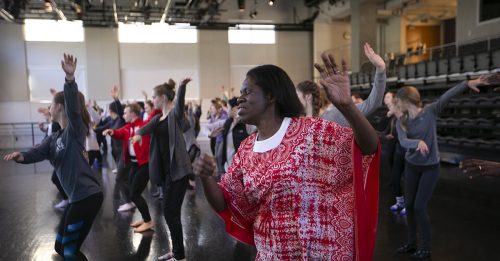
Godelieve Mukasarasi started a group in Rwanda called Solidarity for the Blooming of the Widows and the Orphans, Aiming at Work and Self-Promotion — or SEVOTA. Photo by Rodger Mallison
Kwihangana, who helped coordinate the trip in January 2018, said the ongoing relationship between TCU and SEVOTA will help show the world that Rwanda is more than the site of war crimes, genocide and trauma.
“When the media, especially in the West, is giving news about Africa, it’s about war. It’s about hunger. It’s about crime,” Kwihangana said. “You rarely get to see something good being portrayed from Africa.
“I think these trips are necessary, especially at the college level, because when the students come back they are the ambassadors,” he added. “They can tell their family and their friends about the trip, and it helps change the image of Rwanda and Africa.”
Sexual violence continues to be used as a weapon of war in several countries around the globe, including South Sudan, Congo, Myanmar and Iraq.
During her campus visit in November 2018, Mukasarasi met with several groups of TCU students, including social work majors. One of those students asked what issues they should think about beyond the borders of Texas and the U.S.
“We should put our efforts together and stop wars around the world,” Mukasarasi said. “Poverty, hate and sexual violence come out of that. Women in Congo are facing the same problem we did, and women everywhere are affected.”
On a walk across campus that autumn day, Mukasarasi said she had seen signs for Mental Health Awareness Week that informed students a woman is raped every 98 seconds. “Every 98 seconds,” she repeated. “That’s something we should fight.”

Your comments are welcome
Comments
Related reading:
Alumni, Features
Swanee Hunt Pushes for Inclusion of Women in Peace Building
The humanitarian champions women helping their countries recover from war.
Features
Warrior for Peace
Nobel laureate Leymah Gbowee mobilized women to demand an end to Liberia’s second civil war.
Features
Peace for the Next Generation
Jaime Horn ’98 trains female negotiators.